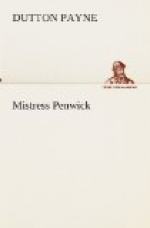“But he lost it all, as I’ve heard ofttime from father; he has spoken not infrequent of Sir John’s high living; he had great demesne, a great heart and great temper; and ’tis the last named that has fallen clear and uncumbered to his daughter; and the heart will be found by careful probing, no doubt; and the demesne she will have when she condescends to take me as spouse.”
“Thou, thou espouse her?” and Constance feigned surprise, as if ’twere a new thing to her, when in reality she had suffered agony from its repetition.
“Aye, and why not, pray? Am I not of ripe years and know my mind?”
“And why so?—because thou shouldst wed one of high degree and fortune and worldly wisdom.”
“Nay, thou art wrong. ’Tis enough that she is of noble blood from father and mother; and I have fortune for us both; and worldly wisdom—bah! Constance, dost thou expect her to know all the intrigues of court, when she is but lightly past fifteen?”
“Fifteen?—Now by heaven, Cedric, thou wouldst not lie to me?”
“Nay, Con, I would not—I have no object in this case, ’tis a truth.”
“Fifteen, and indeed she is well-formed for such youth!”
“And what a beautiful and innocent face she has, too?”
“Beauteous, admitted; but innocent of what?”
“Innocent of all we know; she knows naught of this great world. Janet keeps all evil from her. We cannot conceive of such innocence in any one. The child has eaten the simplest things all her life; milk and gruel and beef-whey; ’tis no great wonder she is so pink and strong; Janet says in hand-to-hand battle in their convent chamber, the child hath thrown her oft in fair wit of strength;—such rough sport was not indulged in openly and Janet taught her thrusts and flings to broaden her chest and strengthen hip and back; she is stout and strong, and yet she makes one think of a beautiful flower until she falls in anger; then she shows a stout temper as well, and is wilful to all save Janet, who governs her by some strange method I ne’er saw before; for ’tis odd to see servant lead mistress. But, ’twas an awful thing happened me; I knew not, or had forgotten rather, the arrival of the babe Sir John speaks of. As thou knowest, I came home unexpectedly, and I found the letter here. It had arrived some time before, and I read it hastily, told Wasson my duty and passed the letter to a convenient pocket, and thence until the night of the masque forgot all about the arrival of the infant. I was masqued, mad and raving at Christopher for not mending my bag-pipe, and I rushed swearing after him and Mistress Penwick heard my oaths, my broad Scotch ones thou knowest I love to use when in anger. She hates me for it, and I can do naught to win the confidence due me as her rightful guardian. So I have settled upon an immediate espousal—”
“Immediate? Thou marry a child,—’tis unseemly—”
“Nay, ’tis not unseemly; ’tis the most proper thing to do. Janet says so, too, and will urge her to accept me as soon as I wish to wed—which shall be at the earliest moment.”




